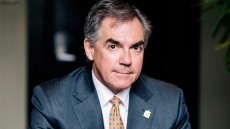OTTAWA - The politically charged trial of suspended Sen. Mike Duffy will begin next spring, six months before the next scheduled federal election.
In a brief proceeding Tuesday, the court set aside 41 days for the case, forgoing a preliminary hearing and scheduling the trial for April 7-May 12 and June 1-19 — smack in the middle of spring campaign season.
Speculation has been rife on Parliament Hill that Prime Minister Stephen Harper could call an election as early as next spring. But the timing of the Duffy trial may put that theory to rest.
As it now stands, the fixed election date is Oct. 19, 2015.
Duffy, a former Conservative senator, faces 31 charges, including fraud, breach of trust and bribery. The last charge deals with a $90,000 cheque Duffy got from Nigel Wright, Harper's one-time chief of staff, to reimburse the Senate for challenged expense claims.
Donald Bayne, Duffy's lawyer, hasn't ruled out the possibility that the prime minister himself might be called to testify. Harper has on many occasions insisted that he knew nothing of the plan to repay Duffy's expenses.
Wright, who was not charged by the RCMP, will almost certainly be called as a witness. He now lives in London, where he is helping build up the European business of Onex Corp., the company he left in 2010 to join the Prime Minister’s Office.
Duffy, a former television personality, was charged last summer. Bayne cited the senator's recurring health problems — he has been treated several times for heart trouble — as his client's rationale for wanting to proceed quickly to trial.
"As we've said from the start, we trust that the evidence will show Sen. Duffy is innocent of these criminal charges," Bayne said Tuesday as he left the courthouse.
Others who could also figure prominently in the legal drama are Harper's former leader in the Senate, Marjory LeBreton, the current Conservative Fund chairman Irving Gerstein, the prime minister's former legal counsel and other close aides.
It's also expected the court will hear from Senate staff and members of the board of internal economy, the secretive all-party committee that controls House of Commons spending.
Even if Harper is called, however, he could simply refuse to testify. The prime minister, like all MPs, has the right to refuse to appear as a witness in court while Parliament is in session.
The exemption extends 40 days before and after a session, as well as periods when Parliament is prorogued. It also extends 40 days after Parliament is dissolved.
Some have tried — and failed — to subpoena sitting prime ministers.
In November 1970, five people charged under the War Measures Act tried to get then-prime minister Pierre Trudeau to appear as a witness as their trial. A judge rejected their bid.
In January 1960, a judge also set aside a subpoena served to John Diefenbaker as part of a civil suit involving election campaign expenses.
But a judge ruled in December 2003 that a First Nation suing the government for $1.4 billion could call former prime minister Jean Chretien as a witness.





